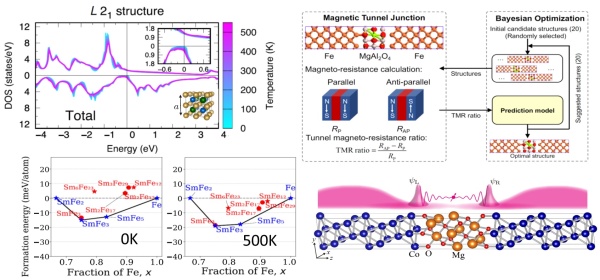Spin Theory Group
Theoretical study for energy-sufficient magnetic and spintronic materials.
In the research Center for Magnetic and Spintronic Materials (CMSM), development of magnetic recording and spintronics devices achieving large-capacity storage and energy-saving computing memories, and the new magnetic materials necessary for the realization of clean energy are performed. To realize these devices, theoretical analysis and predictions at room temperature are required for new magnetic and spintronic materials. The first-principles calculations, which are based on quantum mechanics and only require the atomic configuration of materials as input, play an important role to obtain the fundamental understanding of physical properties. In the spin theory group, we are studying the electronic structures and spin-related phenomenon of magnetic and spintronic materials and devices using the first-principles calculations. By including phonon and magnon contributions in the first-principles calculations with effective model analysis, we perform predictions of the physical properties at finite temperature. We will perform a high-through-put materials design by combining first-principles calculations and the method of materials informatics such as the machine learning, the automatic calculation and data driven analysis.

Specialized Research Field
Permanent magnets, half-metallic ferromagnets, heterojunctions with perpendicular magneto-crystalline anisotropy, and materials with spintronic thermal management are required for applications of magnetic and spintronic materials. We theoretically study the thermal and dynamical stabilities of permanent magnets and the spintronic materials by the formation energy including phonon and magnon entropy. Furthermore, we perform a theoretical analysis of the spin-dependent transport properties at finite temperature of magnetic junctions by including the spin-flip scattering at finite temperature, and show a guide-line to solve the problems in experiments. Magnetic damping, magneto-crystalline anisotropy and spin-orbit torque due to the anomalous Hall effect, the spin Hall effect and the orbital Hall effect, which are essential for energy-efficient magnetization reversal, also studied by the first-principles calculations at finite temperature. Magnetic materials showing thermal spin effects such as the anomalous Nernst effect, the anomalous Ettingshausen effect, and anisotropic magneto-Peltier effect are also theoretically investigated in collaboration with experimental groups.




